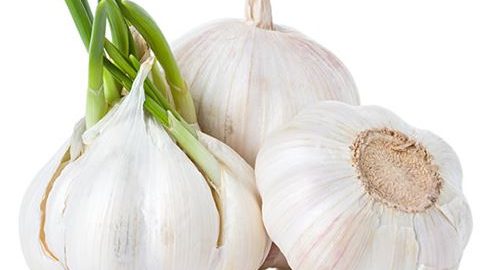
Description : Garlic (Allium sativum), a herb used widely as a flavoring in cooking, has also been used as a medicine throughout ancient and modern history to prevent and treat a wide range of conditions and diseases.
Garlic belongs to the onion genus Allium, and is closely related to the onion, rakkyo, chive, leek, and shallot. It has been used by humans for thousands of years and was used in Ancient Egypt for both culinary purposes and its health and therapeutic benefits.
Uses : Garlic is a commonly used food and flavoring agent. When used as a food product, garlic is not likely to produce health benefits or side effects. When used as a medicinal product, garlic may produce both desired and unwanted effects on the body.
Garlic products sold as health supplements may vary widely in amount of allicin, the active ingredient in garlic. Allicin is unstable and can be reduced in garlic products that are aged to reduce odor. Odorless garlic may contain little to no allicin. The lower the amount of allicin, the less effective a garlic product might be.
Garlic taken orally (by mouth) has been used in alternative medicine as a possibly effective aid in treating high blood pressure, coronary artery disease (hardened arteries), stomach cancer, colon cancer or rectal cancer, and in preventing tick bites. Garlic applied to the skin may also be possibly effective in treating fungal skin infections such as ringworm, jock itch, or athlete’s foot.
Garlic has also been used to treat high cholesterol, stomach ulcers caused by H. pylori, cancer, or circulation problems in the legs. However, research has shown that garlic may not be effective in treating these conditions.
Benefits :
Side Effects :
- Even garlic isn’t perfect. Apart from garlic breath there are other possible side effects, especially if used to excess. Use common sense and don’t overdo it.
- Raw garlic is very strong, so eating too much could produce problems, for example irritation of or even damage to the digestive tract.
- There are a few people who are allergic to garlic. Symptoms of garlic allergy include skin rash, temperature and headaches. Also, garlic could potentially disrupt anti-coagulants, so it’s best avoided before surgery. As with any medicine, always check with your doctor first and tell your doctor if you are using it.
Garlic Oil
Garlic Oil is derived from the crushed bulbs of garlic, Allium sativum Linn. They have a powerful and obnoxious odour due to the presence of disulphides. The bulbs contain 0.06% to 0.1% of volatile oil whose active constituents are propyl /-disulphide, alliin and allicin. The yellow oil of garlic is a valuable flavouring agent in perfumery, as insect repellant. Allicin present in volatile oil is a powerful antibacterial.
|  |
| Specifications Garlic Oil | ||
| Product | : | Garlic Oil |
| Description Liquid | : | Yellow Orange to Yellow Brown |
| Organoleptic Test | : | Strong Characteristic Odour &Taste |
| Extraction | : | By Steam Distillation |
| Additive | : | Nil |
| Solubility | : | Soluble in most Fixed oil & Mineral Oil and insoluble in Glycyrine |
| Heavy metals | : | Not more than 20 ppm as Pb Not more than 3 ppm as Arsenic |
| Non volatile matter | : | Nil |

